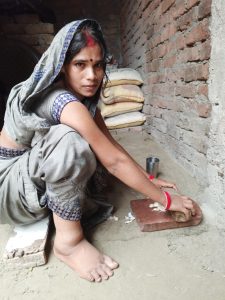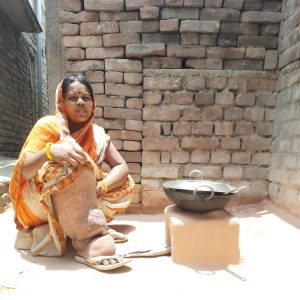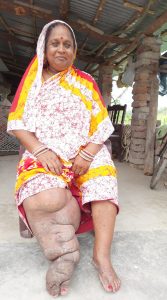HEALTH
CARE India turning stories of suffering, discrimination, and neglect into narratives of hope under the Elimination of Lymphatic Filariasis program.
लगैय गोर फुलल हई (seems the feet have swollen) is a regular statement of the village women. Most of them complain of swollen feet some time or the other in their lifetime. This is how filaria (commonly referred name for Lymphatic Filariasis) is first noticed in the community. Filariasis is one of the most ignored and often misunderstood disease among the rural people. The first local diagnosis invariably attributes it to cold weather, and they stop eating rice, curd, banana and the like, as precaution while the root cause of the disease untreated and often unknown. Practically no awareness among community is one of the impediments in eliminating filariasis at the ground level. Awareness, prevention and relief are three strategies that CARE India is focussing on while supporting on Government of India’s Elimination of Lymphatic Filariasis (ELF) program in Bihar.
Once the symptom surfaces and restricts mobility, it has serious implications on everyday living. Life gets more complicated for women considering discriminations they already face in society. This series focuses on lived experiences of suffering women and their fight with this disease in Vaishali district, Bihar.
Married at twelve, Sulekha Devi (now 30 years), is a mother of four children. She lives in Ekara village. She says, “After the birth of my fourth child, one day I felt an enlarged lymph node emerging in my right thigh and within a day that had gone to the foot. I felt cold and had high fever along with the unbearable pain in the foot.” She could not understand why this was happening, took some medicines for fever and pain and got some relief for the time being. Gradually the swelling increased. It has since become a real problem for her and she has been living with this pain for last four years, shared Sulekha. She says, “Life has become slow because of this disease, and I feel heavy all the time. I can neither stand for long time nor sit and thus the household chores become a big problem for me.” Cooking, cleaning, washing utensils, filling water, taking care of four children and husband is a big task which gets hampered due to this disease. At least twice a month, she gets bout of fever, cold and pain and feels handicapped at that time. She too wanted to work outside and support her family as taking care of the kids is very expensive these days. She got a job of a cook in a bank’s canteen sometime back. But her husband asked her to stay at home, saying she was not able to take care of the family and herself with this heavy leg, how could she work outside.
this pain for last four years, shared Sulekha. She says, “Life has become slow because of this disease, and I feel heavy all the time. I can neither stand for long time nor sit and thus the household chores become a big problem for me.” Cooking, cleaning, washing utensils, filling water, taking care of four children and husband is a big task which gets hampered due to this disease. At least twice a month, she gets bout of fever, cold and pain and feels handicapped at that time. She too wanted to work outside and support her family as taking care of the kids is very expensive these days. She got a job of a cook in a bank’s canteen sometime back. But her husband asked her to stay at home, saying she was not able to take care of the family and herself with this heavy leg, how could she work outside.
“I was married off very young and seen all the shades of life at a very early age so always dreamt of providing best studies and good life to my children. I wanted to earn for them, wanted to literally fly but God restricted my mobility, and I can hardly walk now” added Sulekha wiping her forehead on a sultry July afternoon.
CARE India’s Block Coordinator, Animesh Kumar Tiwari shared that Sulekha is possibly suffering from Stage two lymphoedema and that can be stopped there itself if she gets right treatment and medication. And we will try to ensure that to the best of our capacities.
 Sanju Devi (35 years), Ekara village is yet another victim of filariasis disease and her condition has worsened over the years. She is struggling with advanced lymphedema now. Sanju felt swelling and pain in her leg during her first pregnancy way back in the year 2003. She complained that to her gynaecologist to which she was told that these symptoms were associated with her pregnancy and that she would be fine after childbirth. After her delivery, there was no change in the swelling, rather it increased day by day and pus started coming out of her lesion. She consulted with many rural health practitioners, private doctors and even tried Homeopathy but to no avail. “At times when I get fever and cold, I can’t even get out of my bed. The pain in leg feels like as if someone has rubbed red chilli powder on it, shared Sanju.
Sanju Devi (35 years), Ekara village is yet another victim of filariasis disease and her condition has worsened over the years. She is struggling with advanced lymphedema now. Sanju felt swelling and pain in her leg during her first pregnancy way back in the year 2003. She complained that to her gynaecologist to which she was told that these symptoms were associated with her pregnancy and that she would be fine after childbirth. After her delivery, there was no change in the swelling, rather it increased day by day and pus started coming out of her lesion. She consulted with many rural health practitioners, private doctors and even tried Homeopathy but to no avail. “At times when I get fever and cold, I can’t even get out of my bed. The pain in leg feels like as if someone has rubbed red chilli powder on it, shared Sanju.
“I feel so handicapped when I am not able to stand long enough for my household chores. Both my sons are grown up now, by the grace of God. By no means was it a smooth journey. I was stigmatised for bringing this disease from my parent’s house”, added Sanju. Her family ignored her pain when she needed care and medication. She feels outcast in her own family due to this disability. She wished she could earn and spend on her own medication. However, her body does not support her any longer. Sometimes she cries in isolation and prays to God to provide her the strength to bear this pain and discrimination. “I have a long life ahead and it is very difficult to manage with this kind of pain and suffering. Relatives and other women in the neighbourhood keep distance from me, I feel so isolated and stigmatized and that has affected my mental health in a big way” shared a teary eyed Sanju.
 Sunita Devi (53 years) has a somewhat similar story to share. The fever and cold attacks started for Sunita when she was about ten years old. It aggravated after she turned fifteen. She got married soon after and she faced all sorts of hardships at an early age.
Sunita Devi (53 years) has a somewhat similar story to share. The fever and cold attacks started for Sunita when she was about ten years old. It aggravated after she turned fifteen. She got married soon after and she faced all sorts of hardships at an early age.
“I feel ashamed of going out for any wedding or function in the locality/relative’s place as people keep staring at my feet and the way I walk. Public perception towards this disease is rather negative and I am treated indifferently. People won’t say anything directly, but their unwelcoming eyes make me uncomfortable,” shared Sunita Devi. “I am suffering from diabetes and heart problems, and I can’t walk or do any exercise due to this disease. Even a regular, routine job like taking a bath feels like a difficult task. I do feel restricted, I can’t travel on two- wheelers, no slipper fits my feet, and I am forced to walk without one,” added Sunita Devi.
Filaria patients are diagnosed at PHCs and are provided medicines and Morbidity Management and Disability Prevention (MMDP) kits as required under the Elimination of Lymphatic Filariasis (ELF) program of the government of India. An MMDP kit normally has a tub, mug, soap, towel and ointments for bacterial and fungal infections. CARE India is supporting the government of Bihar in line listing of filaria patients and sending them to the health facilities for treatment. The treatment depends on the grading of the disability, which is done according to the severity of the disease.
“Sulekha and Sanju have been diagnosed by doctor, got self-care tips and received MMDP kits at their block PHC and Sunita Devi will also be soon diagnosed and receive MMDP kit as we are working on it” confirmed Animesh.
About the Programme:
CARE India has been supporting the Elimination of Lymphatic Filariasis program of the Government of India for the last one year. The LF project works from the village level to the state level in addressing the gaps in the planning and implementation of the interventions like disease monitoring through Night Blood Surveys, Mass Drug Administration as preventive chemotherapy, Morbidity Management and Disability Prevention and LF MIS





